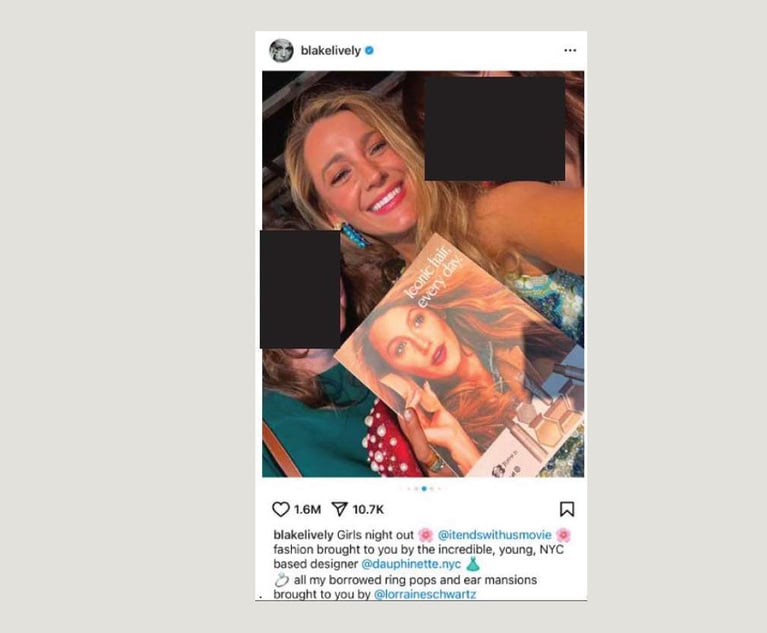'That's Wrong': NCAA Lawyer, Judge Butt Heads in Closing Arguments in Athlete Compensation Case
The NCAA's lead lawyer Beth Wilkinson of Wilkinson Walsh + Eskovitz told U.S. District Judge Claudia Wilken multiple times during closing arguments Tuesday that the judge had the facts wrong.
December 18, 2018 at 07:01 PM
4 minute read
 National Collegiate Athletic Association headquarters in Indianapolis. (Credit: Shutterstock)
National Collegiate Athletic Association headquarters in Indianapolis. (Credit: Shutterstock)
At closing arguments in the latest challenge to the National Collegiate Athletic Association's limits on compensating athletes in college sports, a high-profile attorney representing the association seemed to be gearing up for an inevitable appeal.
Beth Wilkinson of Wilkinson Walsh + Eskovitz on multiple occasions during Tuesday's four-hour hearing told U.S. District Judge Claudia Wilken that she disagreed with the judge and that Wilken was mistaken about some underlying facts.
“That's just wrong,” said Wilkinson after the judge said that some conferences and schools already enforce compensation rules on their own. Wilkinson also corrected the judge when she implied that teams from different conferences only play each other in the postseason.
The underlying case involves a class of current and former student-athletes in Division 1 football and men's and women's Division 1 basketball. Plaintiffs claim that the NCAA's limits on scholarships and benefits that student-athletes can receive as compensation for their athletic performance violate antitrust law.
Wilken opened Tuesday's closing arguments by saying that it “seems very clear” that the NCAA violated antitrust laws. But Wilkinson disagreed.
“We have not ever conceded that there was an antitrust violation,” she said. Although Wilkinson conceded that the judge found a “restraint on trade” on summary judgment, she insisted that her client hadn't conceded that it violated the antitrust laws.
“You want to tell me there is not an agreement to restrain trade?” Wilken asked. “An agreement to restrain trade that affected interstate?”
On summary judgment in March, Wilken sided with the plaintiffs' team, which includes Hagens Berman Sobol Shapiro's Steve Berman and Winston & Strawn's Jeffrey Kessler. The judge wrote that she found “undisputed evidence” that college football and basketball players would be offered greater compensation and benefits during recruitment without the existing NCAA limits.
Wilken's ruling required lawyers for the NCAA and member conferences to show during the ensuing bench trial that limits on player compensation help drive consumer demand for college sports and create an atmosphere that helps college-athletes integrate into their school communities.
Bart Williams of Proskauer Rose argued Tuesday on behalf of the conferences. Williams said that compensating college athletes could change the incentive structure in ways that cause them to focus on athletics more and their studies less.
“Their incentive to go to class, their whole focus on the academic side of things would change,” said Williams, adding that an increase in compensation to athletes could also drive a wedge between the athletes and their classmates. “There already is a perception on many campuses that the athletes are favored in some way.”
Hagens Berman's Steve Berman responded for the plaintiffs that the NCAA had produced no evidence during the bench trial showing that an increase in competition to compensate college athletes would result in problems with them integrating into the academic culture. The case, Berman noted, was not challenging the NCAA's academic eligibility rules. Berman also said that after a prior legal challenge resulted in colleges raising their limits to the actual cost of attendance at schools, graduation rates for athletes actually went up. “There has been a positive relationship between increased benefits and academic” performance, he said.
Wilken asked the lawyers for help in finding a framework to balance the anticompetitive effects of the NCAAs restraints and the procompetitive effects the league claims amateurism has on the college sports market. But when walking through the plaintiffs' different forms of proposed injunctions, the judge did sound persuaded that the individual conferences could set the compensation rules in ways that might be more beneficial to college athletes.
When the judge asked Wilkinson to walk through which of the plaintiffs' proposals was most workable to the NCAA, the NCAA's lawyer urged the judge to leave the current regime in place. The plaintiffs, Wilkinson argued, had offered no evidence of what economic impact their changes would have on college sports as a whole.
“You have a national regulatory scheme that keeps the product in place and popular,” she said.
This content has been archived. It is available through our partners, LexisNexis® and Bloomberg Law.
To view this content, please continue to their sites.
Not a Lexis Subscriber?
Subscribe Now
Not a Bloomberg Law Subscriber?
Subscribe Now
NOT FOR REPRINT
© 2025 ALM Global, LLC, All Rights Reserved. Request academic re-use from www.copyright.com. All other uses, submit a request to [email protected]. For more information visit Asset & Logo Licensing.
You Might Like
View All
Morgan Lewis Shutters Shenzhen Office Less Than Two Years After Launch

Texas-Based Ferguson Braswell Expands in California With 6-Lawyer Team From Orange County Law Firm
2 minute read

Justin Baldoni Sues Blake Lively and Ryan Reynolds for $400M in New Step in 'It Ends With Us' Fight
6 minute readTrending Stories
- 1'A Death Sentence for TikTok'?: Litigators and Experts Weigh Impact of Potential Ban on Creators and Data Privacy
- 2Bribery Case Against Former Lt. Gov. Brian Benjamin Is Dropped
- 3‘Extremely Disturbing’: AI Firms Face Class Action by ‘Taskers’ Exposed to Traumatic Content
- 4State Appeals Court Revives BraunHagey Lawsuit Alleging $4.2M Unlawful Wire to China
- 5Invoking Trump, AG Bonta Reminds Lawyers of Duties to Noncitizens in Plea Dealing
Who Got The Work
J. Brugh Lower of Gibbons has entered an appearance for industrial equipment supplier Devco Corporation in a pending trademark infringement lawsuit. The suit, accusing the defendant of selling knock-off Graco products, was filed Dec. 18 in New Jersey District Court by Rivkin Radler on behalf of Graco Inc. and Graco Minnesota. The case, assigned to U.S. District Judge Zahid N. Quraishi, is 3:24-cv-11294, Graco Inc. et al v. Devco Corporation.
Who Got The Work
Rebecca Maller-Stein and Kent A. Yalowitz of Arnold & Porter Kaye Scholer have entered their appearances for Hanaco Venture Capital and its executives, Lior Prosor and David Frankel, in a pending securities lawsuit. The action, filed on Dec. 24 in New York Southern District Court by Zell, Aron & Co. on behalf of Goldeneye Advisors, accuses the defendants of negligently and fraudulently managing the plaintiff's $1 million investment. The case, assigned to U.S. District Judge Vernon S. Broderick, is 1:24-cv-09918, Goldeneye Advisors, LLC v. Hanaco Venture Capital, Ltd. et al.
Who Got The Work
Attorneys from A&O Shearman has stepped in as defense counsel for Toronto-Dominion Bank and other defendants in a pending securities class action. The suit, filed Dec. 11 in New York Southern District Court by Bleichmar Fonti & Auld, accuses the defendants of concealing the bank's 'pervasive' deficiencies in regards to its compliance with the Bank Secrecy Act and the quality of its anti-money laundering controls. The case, assigned to U.S. District Judge Arun Subramanian, is 1:24-cv-09445, Gonzalez v. The Toronto-Dominion Bank et al.
Who Got The Work
Crown Castle International, a Pennsylvania company providing shared communications infrastructure, has turned to Luke D. Wolf of Gordon Rees Scully Mansukhani to fend off a pending breach-of-contract lawsuit. The court action, filed Nov. 25 in Michigan Eastern District Court by Hooper Hathaway PC on behalf of The Town Residences LLC, accuses Crown Castle of failing to transfer approximately $30,000 in utility payments from T-Mobile in breach of a roof-top lease and assignment agreement. The case, assigned to U.S. District Judge Susan K. Declercq, is 2:24-cv-13131, The Town Residences LLC v. T-Mobile US, Inc. et al.
Who Got The Work
Wilfred P. Coronato and Daniel M. Schwartz of McCarter & English have stepped in as defense counsel to Electrolux Home Products Inc. in a pending product liability lawsuit. The court action, filed Nov. 26 in New York Eastern District Court by Poulos Lopiccolo PC and Nagel Rice LLP on behalf of David Stern, alleges that the defendant's refrigerators’ drawers and shelving repeatedly break and fall apart within months after purchase. The case, assigned to U.S. District Judge Joan M. Azrack, is 2:24-cv-08204, Stern v. Electrolux Home Products, Inc.
Featured Firms
Law Offices of Gary Martin Hays & Associates, P.C.
(470) 294-1674
Law Offices of Mark E. Salomone
(857) 444-6468
Smith & Hassler
(713) 739-1250






